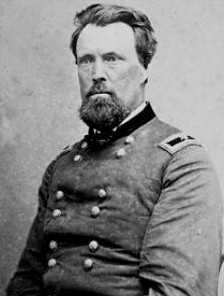Samuel Beatty, born on December 16, 1820, in Big Valley, Pennsylvania, was an American soldier, sheriff, and farmer who played a significant role as a Brigadier General in the Union Army during the American Civil War. He was raised in Stark County, Ohio, and served as a lieutenant in the Third Ohio Infantry during the Mexican-American War in the 1840s, before becoming the sheriff of Stark County from 1850-1854 [3]5.
When the Civil War erupted, Beatty helped organize the 19th Ohio Volunteer Infantry and was elected the regiment’s first Colonel. He led the 19th Ohio Infantry in a series of battles in Virginia and commanded the 11th Brigade, 5th Division, II Corps in Kentucky [7]. Beatty played a key role in the Battle of Stones River, which was fought from December 31, 1862, to January 2, 1863, and was one of the bloodiest battles of the Civil War. He also played a significant role in the Battle of Chickamauga, fought from September 19-20, 1863, where his brigade held a crucial position in the Union line [1].
However, it was Beatty’s actions during the Battle of Gettysburg that cemented his place in history. The Battle of Gettysburg, fought from July 1-3, 1863, was a turning point in the Civil War and is considered one of the most significant battles in American history. Beatty played a critical role in the defense of Cemetery Hill, a strategic position in the Union line. On the night of July 2, Beatty’s brigade arrived at Cemetery Hill and took up positions to defend against a Confederate attack. On July 3, when the Confederate forces launched a massive assault known as Pickett’s Charge, Beatty’s brigade played a crucial role in repulsing the attack, helping to secure the Union victory at Gettysburg [1].
Beatty’s leadership and bravery during the Battle of Gettysburg earned him a promotion to Brigadier General on August 8, 1863. He continued to lead his brigade through the rest of the war, including the Battle of Nashville, fought from December 15-16, 1864, which was a significant Union victory that helped to cripple the Confederate army in the West [1].
After the war, Beatty returned to Ohio and became a farmer. In 1866, he was awarded the brevet grade of major general of volunteers in recognition of his service during the war [1].
In conclusion, Samuel Beatty was a key figure in the Union Army during the American Civil War. Born in Big Valley, Pennsylvania, Beatty’s leadership and bravery during the Battle of Gettysburg played a significant role in securing the Union victory and cementing his place in history. His contributions to the war effort, including his service in battles such as Stones River and Chickamauga, and his promotion to Brigadier General, make him a significant figure in American military history.

